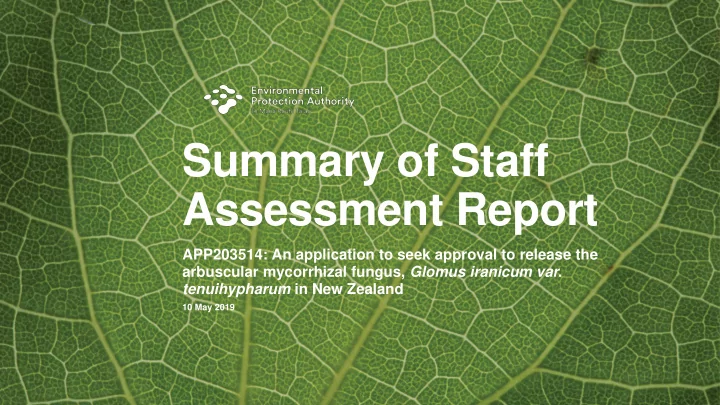

Summary of Staff Assessment Report APP203514: An application to seek approval to release the arbuscular mycorrhizal fungus, Glomus iranicum var. tenuihypharum in New Zealand 10 May 2019
The application 2 • Symborg Business Development S.L. lodged an application to the Environmental Protection Authority on 3 October 2018 to release the arbuscular mycorrhizal fungi (AMF), Glomus iranicum var. tenuihypharum . • The application was publicly notified. The EPA received 6 submissions with all in opposition. Five submitters indicated they wish to be heard.
Glomus iranicum var. tenuihypharum 3 • Isolated in Spain • Arbuscular mycorrhizal fungi (AMF) • Lacks aerial spores, propagates through contact of spores, mycelium or vesicles with the roots of a new host plant • Obligatory symbiont • Cannot be cultured in lab • Non-GMO • Used in over 30 countries Light micrographs of spores, APP203514 application form.
Risk/benefits assessment 4 We assessed the risks and benefits of releasing this organism in New Zealand, assuming the successful establishment of self-sustaining populations. We assessed the risks and benefits to: • the environment, • market economy, • people and communities, • Māori and their relationship with the environment, and • public health.
Environmental benefits 5 o Improved salinity resistance, nutrient uptake, growth and biochemical performance of target plant species - agricultural crops o Promotion of root expansion and root volume/density o Potential conservational tool for native plants and coasts o The magnitude of effects would depend on the location and the extent of application. While benefits are likely to occur, we estimated the environmental benefits to be minor (national level) to moderate (localised)
Economic benefits 6 o Improved farm productivity, profitability and value through improved yield, shorter timeframes for plants to mature and larger fruits o Improved sustainability of agricultural systems and reduction in farming input costs associated with fertiliser usage o We concluded that benefits to the market economy would be likely and determined the magnitude of benefits to be minor (national scale) and moderate (localised or regional).
Environmental risks 7 o Non-target impacts on native plant species such as improving environmental conditions and fitness of invasive weeds o Competition between G. i. var. tenuihypharum and native fungi o Displacement of native fungi in non-application zones o We considered it unlikely for G. i. var. tenuihypharum to disturb or modify ecosystems adversely. Any effects would be minimal, localised. o We concluded there would be low to negligible indirect adverse effects and the magnitude of the effects to be minimal to minor .
Economic risks 8 o Impose high carbon demands on host plants and limit their growth = reduced yield = increase in costs attributed to fertiliser use o Increase in costs attributed to herbicide use = improved env conditions for weeds = weed proliferation = increase in costs to control / eradicate weeds o We concluded that there is a minor risk to the market economy but the effects would be negligible indirect adverse effects and we considered these to be unlikely .
Summary of our assessment 9 Likelihood Magnitude / Effect Keys areas Environment (scale) • Local to regional Likely Minor / Medium Benefits • National Likely Minor / Medium Economy (scale) • Local to regional Likely Moderate / High • National Likely Minor / Low Environment • Risks Displacement of native AMF Likely Minor / Low • Making plants invasive Unlikely Minimal/Minor / Negligible Economy Unlikely Minor / Negligible
Relationship of Māori to the Environment 10 • Kaupapa Kura Taiao completed a cultural risk assessment of the application and concluded the potential benefits of Glomus iranicum var. tenuihypharum are likely to outweigh the risks/costs • The potential risks to Māori interests would probably be acceptable • There are some significant uncertainties and information gaps that remain. The uncertainties are in relation to potential impacts on native fungal species and wider ecosystem effects. Minimum standards • We assessed the release of Glomus iranicum var. tenuihypharum against the minimum standards (s36) in the HSNO Act. • We concluded that Glomus iranicum var. tenuihypharum meets the minimum standards.
Recommendation 11 • We found the benefits of releasing Glomus iranicum var. tenuihypharum outweigh the risks and costs. • We determined Glomus iranicum var. tenuihypharum meets the minimum standards. • We recommend the decision-making committee approve the release of Glomus iranicum var. tenuihypharum.
For more information contact: General enquiries Phone +64 4 916 2426 Fax +64 4 914 0433 info@epa.govt.nz
Recommend
More recommend